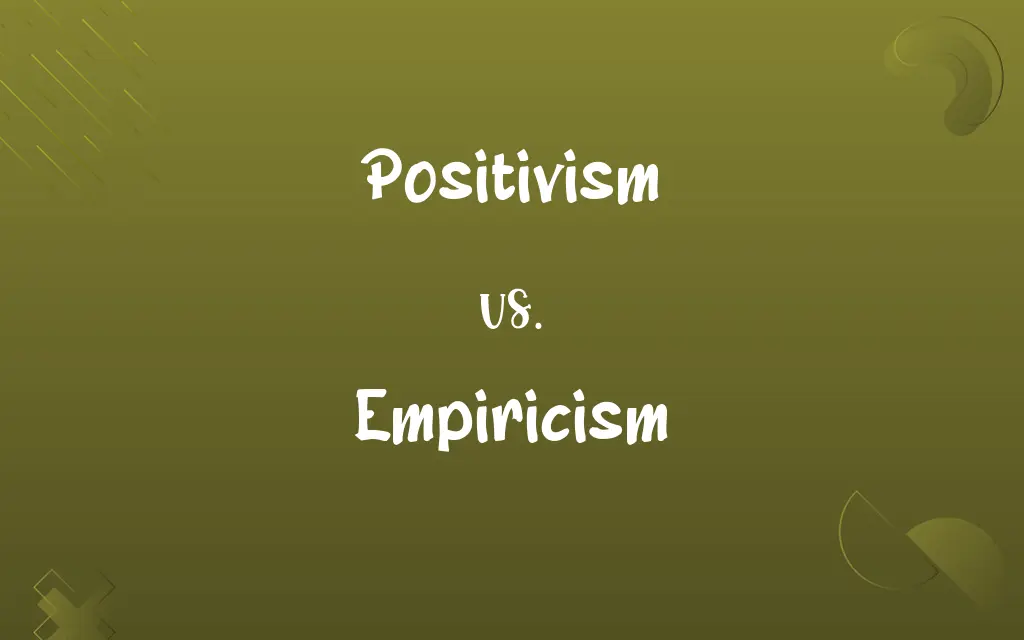Positivism vs. Empiricism: Know the Difference

By Shumaila Saeed || Updated on December 25, 2023
Positivism is a theory advocating empirical evidence for knowledge, while Empiricism emphasizes observation and experience as knowledge sources.

Key Differences
Positivism, founded by Auguste Comte, is a philosophical theory that asserts only scientific knowledge derived from logical and mathematical treatments is valid. Conversely, Empiricism, a broader philosophical standpoint, posits that knowledge comes primarily from sensory experience. Both prioritize observable data, but Positivism confines it to a scientific scope.
Shumaila Saeed
Nov 30, 2023
In Positivism, the focus is on empirically observable, testable information and a rejection of metaphysics. Empiricism, however, values experience and observation without necessarily dismissing non-scientific knowledge. Both schools of thought share a commitment to understanding the world through observable facts, yet they differ in their openness to different knowledge forms.
Shumaila Saeed
Nov 30, 2023
Positivism leans heavily on the scientific method, advocating for the use of experiments, observation, and logic. Empiricism, while also valuing observation, is less stringent about the methods of acquiring knowledge, accepting various observational experiences. Both emphasize the external world's role in shaping understanding but differ in methodological strictness.
Shumaila Saeed
Nov 30, 2023
In Positivism, there's a significant emphasis on progress through science and technology, often linked to a historical perspective of societal evolution. Empiricism, in contrast, doesn't inherently link knowledge to historical progress, focusing more on individual understanding through sensory experience. Both, however, contribute to the advancement of human understanding.
Shumaila Saeed
Nov 30, 2023
Positivism often leads to the conclusion that metaphysical claims are meaningless, as they cannot be tested. Empiricism, while skeptical of unobservable phenomena, does not necessarily dismiss metaphysical concepts if they can be tied to sensory experiences. Both philosophies approach the question of metaphysics differently, reflecting their foundational principles.
Shumaila Saeed
Nov 30, 2023
ADVERTISEMENT
Comparison Chart
Basis of Knowledge
Logical and mathematical treatments
Sensory experience and observation
Shumaila Saeed
Nov 30, 2023
View on Metaphysics
Generally rejects as meaningless
Skeptical but doesn’t dismiss if linked to sensory experience
Shumaila Saeed
Nov 30, 2023
Methodology
Strict adherence to the scientific method
Less stringent, values varied observational experiences
Shumaila Saeed
Nov 30, 2023
Relation to Science and Technology
Sees as key to progress and knowledge
Values but doesn’t equate with knowledge acquisition
Shumaila Saeed
Nov 30, 2023
Historical Perspective
Often linked to societal evolution
Focuses more on individual understanding, less on historical progress
Shumaila Saeed
Nov 30, 2023
ADVERTISEMENT
Positivism and Empiricism Definitions
Positivism
Positivism holds that all legitimate knowledge can be scientifically verified.
The scientist's positivist viewpoint led her to reject hypotheses that couldn't be experimentally tested.
Shumaila Saeed
Nov 30, 2023
Empiricism
Empiricism holds that the origin of all knowledge is sense experience.
In empiricism, the validity of a scientific theory is contingent on its observational support.
Shumaila Saeed
Nov 30, 2023
Positivism
Positivism emphasizes the importance of observable facts and phenomena.
Positivism in sociology dismisses theories not grounded in observable social behaviors.
Shumaila Saeed
Nov 30, 2023
Empiricism
Empiricism is the theory that knowledge is derived from sensory experience.
Empiricism in his approach meant basing conclusions on experimental observations.
Shumaila Saeed
Nov 30, 2023
Positivism
Positivism advocates for knowledge based on empirical evidence.
In his research, he adhered to positivism, relying solely on quantifiable data.
Shumaila Saeed
Nov 30, 2023
ADVERTISEMENT
Empiricism
Empiricism emphasizes the role of experience and evidence in the formation of ideas.
The teacher’s empirical methods involved students learning through hands-on experiments.
Shumaila Saeed
Nov 30, 2023
Positivism
Positivism is a theory that rejects concepts beyond human perception.
Following positivism, the study avoided subjective interpretations, focusing on concrete evidence.
Shumaila Saeed
Nov 30, 2023
Empiricism
Empiricism values observation and experiment in the pursuit of knowledge.
Empiricism guided her study, focusing on data gathered from naturalistic settings.
Shumaila Saeed
Nov 30, 2023
Positivism
Positivism is the philosophy that only scientific knowledge is meaningful.
The positivist approach in psychology focuses on measurable, observable data.
Shumaila Saeed
Nov 30, 2023
Empiricism
Empiricism is a philosophical stance prioritizing evidence from the senses.
Empiricism in historical research emphasizes primary sources as direct sensory evidence of the past.
Shumaila Saeed
Nov 30, 2023
Positivism
A doctrine contending that sense perceptions are the only admissible basis of human knowledge and precise thought.
Shumaila Saeed
Oct 19, 2023
Empiricism
The view that experience, especially of the senses, is the only source of knowledge.
Shumaila Saeed
Oct 19, 2023
Positivism
The application of this doctrine in logic, epistemology, and ethics.
Shumaila Saeed
Oct 19, 2023
Positivism
The system of Auguste Comte designed to supersede theology and metaphysics and depending on a hierarchy of the sciences, beginning with mathematics and culminating in sociology.
Shumaila Saeed
Oct 19, 2023
Positivism
Any of several doctrines or viewpoints, often similar to Comte's, that stress attention to actual practice over consideration of what is ideal
"Positivism became the 'scientific' base for authoritarian politics, especially in Mexico and Brazil" (Raymond Carr).
Shumaila Saeed
Oct 19, 2023
Empiricism
The practice of medicine that disregards scientific theory and relies solely on practical experience.
Shumaila Saeed
Oct 19, 2023
Empiricism
Medicine as practised by an empiric, founded on mere experience, without the aid of science or a knowledge of principles; folk medicine, quackery.
Shumaila Saeed
Oct 19, 2023
Positivism
(philosophy) A doctrine that states that the only authentic knowledge is scientific knowledge, and that such knowledge can only come from positive affirmation of theories through strict scientific method, refusing every form of metaphysics.
Shumaila Saeed
Oct 19, 2023
Empiricism
(philosophy) A doctrine which holds that the only or, at least, the most reliable source of human knowledge is experience, especially perception by means of the physical senses. (Often contrasted with rationalism.)
Shumaila Saeed
Oct 19, 2023
Positivism
(legal) A school of thought in jurisprudence in which the law is seen as separated from moral values; i.e. the law is posited by lawmakers (humans).
Shumaila Saeed
Oct 19, 2023
Empiricism
A pursuit of knowledge purely through experience, especially by means of observation and sometimes by experimentation.
Shumaila Saeed
Oct 19, 2023
Positivism
A system of philosophy originated by M. Auguste Comte, which deals only with positives. It excludes from philosophy everything but the natural phenomena or properties of knowable things, together with their invariable relations of coexistence and succession, as occurring in time and space. Such relations are denominated laws, which are to be discovered by observation, experiment, and comparison. This philosophy holds all inquiry into causes, both efficient and final, to be useless and unprofitable.
Shumaila Saeed
Oct 19, 2023
Empiricism
Used to describe research based on methodology shaped from empirical philosophy (see above), e.g. surveys, statistics, etc.
Shumaila Saeed
Oct 19, 2023
Positivism
The form of empiricism that bases all knowledge on perceptual experience (not on intuition or revelation)
Shumaila Saeed
Oct 19, 2023
Empiricism
The method or practice of an empiric; pursuit of knowledge by observation and experiment.
Shumaila Saeed
Oct 19, 2023
Positivism
A quality or state characterized by certainty or acceptance or affirmation
Shumaila Saeed
Oct 19, 2023
Empiricism
Specifically, a practice of medicine founded on mere experience, without the aid of science or a knowledge of principles; ignorant and unscientific practice; charlatanry; quackery.
Shumaila Saeed
Oct 19, 2023
Empiricism
The philosophical theory which attributes the origin of all our knowledge to experience.
Shumaila Saeed
Oct 19, 2023
Empiricism
(philosophy) the doctrine that knowledge derives from experience
Shumaila Saeed
Oct 19, 2023
Empiricism
Medical practice and advice based on observation and experience in ignorance of scientific findings
Shumaila Saeed
Oct 19, 2023
Repeatedly Asked Queries
What is Positivism?
Positivism is a philosophical theory that stresses the importance of scientific evidence and logical reasoning in the acquisition of knowledge.
Shumaila Saeed
Nov 30, 2023
What does Empiricism emphasize?
Empiricism emphasizes that knowledge comes from sensory experience and observation.
Shumaila Saeed
Nov 30, 2023
What role does the scientific method play in Positivism?
The scientific method is central in Positivism, emphasizing experiments, observation, and logic.
Shumaila Saeed
Nov 30, 2023
Does Positivism reject subjective experiences?
Positivism often rejects subjective experiences as valid sources of knowledge, favoring objective data.
Shumaila Saeed
Nov 30, 2023
Can Empiricism accept metaphysical concepts?
Empiricism can be open to metaphysical concepts if they have a basis in sensory experience.
Shumaila Saeed
Nov 30, 2023
How does Positivism view metaphysical claims?
Positivism typically views metaphysical claims as meaningless since they cannot be empirically verified.
Shumaila Saeed
Nov 30, 2023
How does Empiricism view non-scientific knowledge?
Empiricism can be more open to non-scientific knowledge if it is grounded in sensory experience.
Shumaila Saeed
Nov 30, 2023
Does Empiricism emphasize societal evolution?
Empiricism focuses more on individual understanding rather than societal evolution.
Shumaila Saeed
Nov 30, 2023
Where is Empiricism prominent?
Empiricism is prominent in fields that value sensory experience and observation, like psychology and anthropology.
Shumaila Saeed
Nov 30, 2023
Can Positivism accept non-scientific knowledge?
Positivism generally does not accept non-scientific knowledge as valid.
Shumaila Saeed
Nov 30, 2023
Is historical knowledge considered valid in Positivism?
In Positivism, historical knowledge is valid if it can be scientifically analyzed and proven.
Shumaila Saeed
Nov 30, 2023
Can someone be both a Positivist and an Empiricist?
It's possible, as one can value scientific methods (Positivism) while also accepting broader sensory experiences (Empiricism).
Shumaila Saeed
Nov 30, 2023
Is Empiricism strictly tied to the scientific method?
While Empiricism values the scientific method, it is less stringent and accepts various methods of observation.
Shumaila Saeed
Nov 30, 2023
What’s the relation of Positivism to societal progress?
Positivism often links scientific and technological advancement to societal progress.
Shumaila Saeed
Nov 30, 2023
Do Positivism and Empiricism overlap?
Yes, both overlap in valuing observable, empirical data but differ in their methodologies and scope.
Shumaila Saeed
Nov 30, 2023
Can Empiricism include subjective experiences?
Empiricism can include subjective experiences if they contribute to sensory knowledge.
Shumaila Saeed
Nov 30, 2023
How does Empiricism approach historical knowledge?
Empiricism values historical knowledge, especially if supported by sensory evidence like primary sources.
Shumaila Saeed
Nov 30, 2023
What fields often use Positivism?
Positivism is commonly used in the natural sciences and social sciences focused on quantitative data.
Shumaila Saeed
Nov 30, 2023
What is the role of experimentation in Empiricism?
Experimentation in Empiricism is crucial for gathering sensory data and testing hypotheses.
Shumaila Saeed
Nov 30, 2023
How does Positivism influence research?
Positivism influences research to focus on quantifiable, testable data, often ignoring qualitative aspects.
Shumaila Saeed
Nov 30, 2023
Share this page
Link for your blog / website
HTML
Link to share via messenger
About Author
Written by
Shumaila SaeedShumaila Saeed, an expert content creator with 6 years of experience, specializes in distilling complex topics into easily digestible comparisons, shining a light on the nuances that both inform and educate readers with clarity and accuracy.









































































